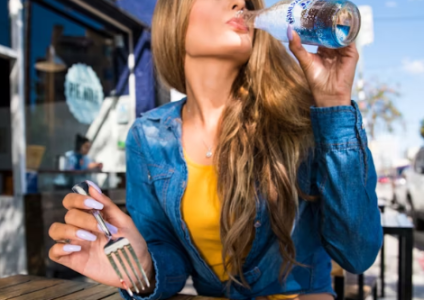Is your go-to daily drink secretly causing hair loss? Experts reveal the shocking truth
- Replies 0
For many people, a sweet or fizzy pick-me-up is part of their daily routine. It’s refreshing, convenient, and often feels harmless compared to other indulgences.
But researchers now warn that what’s inside those cans and bottles may be silently working against your health in ways that extend far beyond weight gain or sugar crashes.
One of the most surprising risks being raised is its potential impact on sabotaging your hairline.
If you’re not ready to embrace the bald-and-beautiful look made famous by the likes of Stanley Tucci or Terry Crews, it might be time to take a closer look at what’s in your glass.
A recent review by Portuguese researchers, published in the journal Nutrition and Health, has put sodas and fizzy drinks under the microscope—and the findings are enough to make anyone think twice before cracking open another can.
After analyzing 17 studies, the scientists found a consistent pattern: people who regularly consume sugary soft drinks and energy drinks may be at a much higher risk of hair loss.
But before you panic and toss out every bottle in your fridge, let’s break down what the research actually says.
The studies reviewed suggest that high consumption of these drinks is associated with reduced hair density, slower growth, less shine, and—most worryingly—increased hair loss.
In one study, men who drank more than 3,500 ml of sugary drinks per week (that’s about 11 cans) were significantly more likely to experience hair thinning and balding.

They’re also loaded with sugar and other stimulants like taurine. This potent cocktail can wreak havoc on your body in several ways:
One trial even linked low protein intake to thinning hair and color changes.
So, if you want to keep your hair looking its best, it’s not just about what you cut out—it’s also about what you put in.
A balanced diet rich in lean proteins, leafy greens, healthy fats, and vitamin D can go a long way toward supporting your scalp.
Dr. Susan Massick, a dermatologist at Ohio State University, points out that male-pattern hair loss is “multifactorial.” Genetics, hormones, age, and overall health all play a role.
Still, with more young men seeking help for hair loss than ever before, it’s worth considering how lifestyle choices might tip the scales.
Also read: A new head of hair—but at what cost? The truth about transplants
A new medication, known as PP405, has shown promise in early trials. Participants who applied a gel containing the drug to their scalp saw new hair growth within eight weeks.
While it’s not yet widely available, it’s a sign that science is making strides in the fight against baldness.
Also read: Ready for a hair transformation? Remilia Hair’s Labor Day Sale just made it easier

Have you noticed changes in your hair after changing your diet or cutting back on sugary drinks? Do you have any tried-and-true tips for keeping your hair healthy? Or maybe you’ve tried one of the new hair regrowth treatments and want to share your experience?
But researchers now warn that what’s inside those cans and bottles may be silently working against your health in ways that extend far beyond weight gain or sugar crashes.
One of the most surprising risks being raised is its potential impact on sabotaging your hairline.
If you’re not ready to embrace the bald-and-beautiful look made famous by the likes of Stanley Tucci or Terry Crews, it might be time to take a closer look at what’s in your glass.
A recent review by Portuguese researchers, published in the journal Nutrition and Health, has put sodas and fizzy drinks under the microscope—and the findings are enough to make anyone think twice before cracking open another can.
After analyzing 17 studies, the scientists found a consistent pattern: people who regularly consume sugary soft drinks and energy drinks may be at a much higher risk of hair loss.
But before you panic and toss out every bottle in your fridge, let’s break down what the research actually says.
The studies reviewed suggest that high consumption of these drinks is associated with reduced hair density, slower growth, less shine, and—most worryingly—increased hair loss.
In one study, men who drank more than 3,500 ml of sugary drinks per week (that’s about 11 cans) were significantly more likely to experience hair thinning and balding.

Sugary sodas and energy drinks are strongly linked to a higher risk of hair loss. Image source: Mineragua Sparkling Water / Unsplash
Why do sugary drinks affect your hair?
The answer lies in what’s inside those colorful cans. Energy drinks, for example, can pack up to 160 mg of caffeine—almost three times what you’d find in a cup of instant coffee.They’re also loaded with sugar and other stimulants like taurine. This potent cocktail can wreak havoc on your body in several ways:
- Caffeine Overload: High caffeine intake can spike your cortisol levels, the infamous "stress hormone." Chronic stress is a well-known trigger for hair loss, as it can push hair follicles into a resting phase, causing more strands to fall out.
- Sugar Rush (and Crash): Excess sugar is linked to poor circulation and inflammation, both of which can weaken hair follicles and make it harder for your scalp to support healthy hair growth.
- Nutrient Deficiency: Relying on sugary drinks can crowd out healthier choices, leading to deficiencies in key nutrients like protein, iron, and vitamin D—all of which are essential for strong, vibrant hair.
What about Vitamin D and other nutrients?
It’s not all doom and gloom. The same review found that maintaining good levels of vitamin D can help protect against both genetic hair loss (androgenetic alopecia) and autoimmune-related hair loss (alopecia areata).One trial even linked low protein intake to thinning hair and color changes.
So, if you want to keep your hair looking its best, it’s not just about what you cut out—it’s also about what you put in.
A balanced diet rich in lean proteins, leafy greens, healthy fats, and vitamin D can go a long way toward supporting your scalp.
Is the science settled?
Not quite. While the evidence is mounting, experts caution that these studies show a correlation, not a direct cause-and-effect.Dr. Susan Massick, a dermatologist at Ohio State University, points out that male-pattern hair loss is “multifactorial.” Genetics, hormones, age, and overall health all play a role.
Still, with more young men seeking help for hair loss than ever before, it’s worth considering how lifestyle choices might tip the scales.
Also read: A new head of hair—but at what cost? The truth about transplants
A new hope for hair regrowth?
If you’re already noticing a receding hairline, there’s some good news on the horizon.A new medication, known as PP405, has shown promise in early trials. Participants who applied a gel containing the drug to their scalp saw new hair growth within eight weeks.
While it’s not yet widely available, it’s a sign that science is making strides in the fight against baldness.
Also read: Ready for a hair transformation? Remilia Hair’s Labor Day Sale just made it easier
What can you do today?
If you’re concerned about hair loss, here are some practical steps you can take right now:- Cut Back on Sugary and Fizzy Drinks: Swap sodas and energy drinks for water, herbal teas, or naturally flavored seltzers.
- Boost Your Vitamin D: Spend some time in the sun, eat vitamin D-rich foods like salmon and eggs, or talk to your doctor about supplements.
- Eat a Balanced Diet: Make sure you’re getting enough protein, iron, and other essential nutrients.
- Manage Stress: Practice relaxation techniques like meditation, yoga, or simply taking a walk in nature.
- Consult a Professional: If you’re worried about hair loss, a dermatologist can help you get to the root of the problem (pun intended!).
Key Takeaways
- Researchers found that regularly drinking sodas and fizzy drinks may significantly increase the risk of hair loss, especially in men.
- Consuming sugar-sweetened beverages has been linked to poorer hair density, thickness, growth, and shine and a higher risk of both genetic and sudden hair loss.
- Maintaining adequate Vitamin D and iron levels, limiting soft drinks and alcohol, and ensuring enough protein intake could help prevent hair thinning and loss.
- Experts note that while there’s growing evidence of a link between sugary fizzy drinks and hair loss, more research is needed to confirm exactly how these drinks may contribute to the problem.






